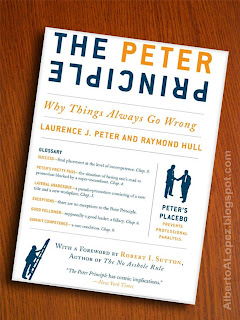 Busy all day? Then, stop the incompetence and do something right for your business.
Busy all day? Then, stop the incompetence and do something right for your business.The logic is simple. Some managers measure success by how busy they are. The busier, the better they think they're doing. As a result, they are also unavailable to others. The more they're needed and the less available they are, the more important to the company they think to be. While seemingly correct on the surface, this idea is absolutely misguided.
Companies are supposed to continue to grow indefinitely. To do so, they need key people to grow with them. These are the key executives that will trail-blaze through the market's jungle. If they stop, progress does too.
These key managers are hired to make big decisions and solve big problems. The higher in the organization one goes, the bigger the responsibilities and the subsequent problems.
But when a manager has used all of her bandwidth, when it can no longer do more, then the manager must be replaced with someone who can; or else, risk stalling progress. This is referred to as the Peter Principle. In a nutshell, this principle says that "in an organizational hierarchy, every employee will rise or get promoted to his or her level of incompetence".
 |
| The Peter Principle |
Have you ever had a middle manager request additional departments, despite not being able to handle the load today? It's like she says, "hey, I am trying really hard for you, so why don't you give me another department?" But how is she going to handle the rest if she is already too busy? Rather than expand, she should simplify her life until she gets better at handling the challenges.
Interestingly, a great manager should become more and more free as she takes on additional responsibilities. She should make things look easy rather than hectic. .
So, how can a manager be more free with added responsibility? Well, through the power of leveraging access to better executives and additional resources.
 |
| Ray Kroc |
As a someone responsible for making big decisions, you must start by displaying a great ability to decide between chores. Many managers get busy out of insecurity. They think that if they're not busy they'll lose their job.
Get rid of the pacifier and start choosing based on the best company results and nothing else. Where is your stop-doing list? Jim Collins, author of best sellers Good to Great and Build to Last, came up with the concept of a stop doing list. He suggested that selecting things that should not get done was just as important as picking things that should; as in the to-do list.
After prioritizing, strategize who in your team will get things done for you. Yes, give the work to others. Give them an opportunity to shine. Along the way, you will also build bench strength. Get into the habit of always developing great managers. You will need them for all the coming opportunities.
But with responsibility comes empowerment. You must be clear about what you expect from them and of the resources available. It is fine to give people a challenge to be solved with less resources than it would take you. Inevitably, you will come across someone who is better than you at achieving the goals. This is the holy grail in management. With lots of practice, you may find many more who are also better than you.
Then, teach your managers to do as you did. To become irrelevant. Tell them that irrelevant managers get more responsibilities than those who are always needed by their team. You will be in great company since Toyota practices this every day.
Then, one day, you will find that you have not a lot to do. You would have developed great managers who themselves have great teams. At such time, work will be much more fun as you will be only involved with the really important stuff. Until then, stop being the bottle neck.

No comments:
Post a Comment